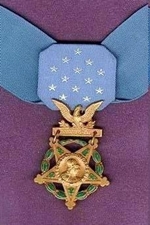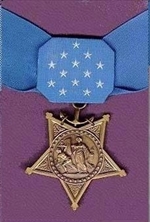 Rank and organization: Specialist Fourth Class, U.S. Army, Company A, 2d Battalion, 1st Infantry, 196th Infantry Brigade, Americal Division.
Rank and organization: Specialist Fourth Class, U.S. Army, Company A, 2d Battalion, 1st Infantry, 196th Infantry Brigade, Americal Division.
Place and date: Quang Tin province, Republic of Vietnam, 19 March 1969. Entered service at: Portland, Maine. Born: 24 June 1948, Washington, D.C. Citation: For conspicuous gallantry and intrepidity in action at the risk of his life above and beyond the call of duty. Sp4c. McMahon distinguished himself while serving as medical aid man with Company A. When the lead elements of his company came under heavy fire from well-fortified enemy positions, 3 soldiers fell seriously wounded. Sp4c. McMahon, with complete disregard for his safety, left his covered position and ran through intense enemy fire to the side of 1 of the wounded, administered first aid and then carried him to safety. He returned through the hail of fire to the side of a second wounded man. Although painfully wounded by an exploding mortar round while returning the wounded man to a secure position, Sp4c. McMahon refused medical attention and heroically ran back through the heavy enemy fire toward his remaining wounded comrade. He fell mortally wounded before he could rescue the last man. Sp4c. McMahon’s undaunted concern for the welfare of his comrades at the cost of his life are in keeping with the highest traditions of the military service and reflect great credit on himself, his unit, and the U.S. Army.

